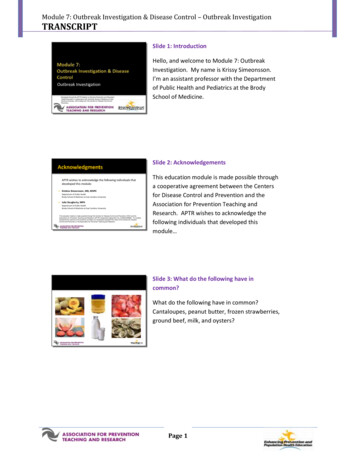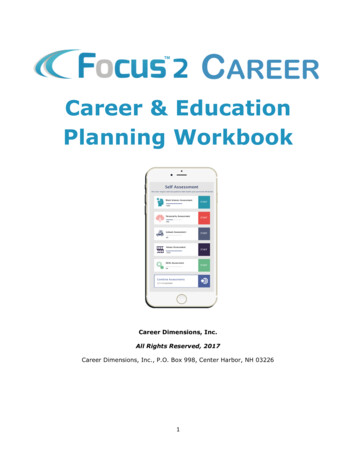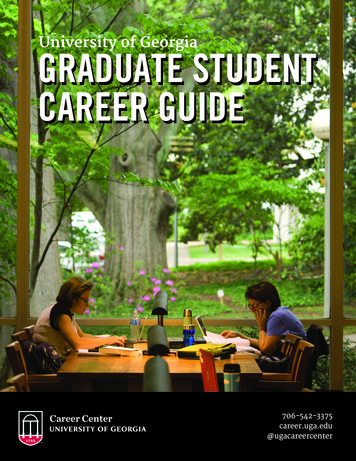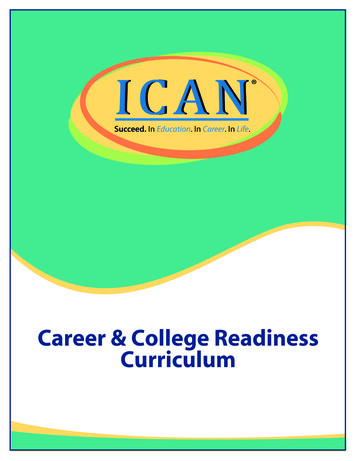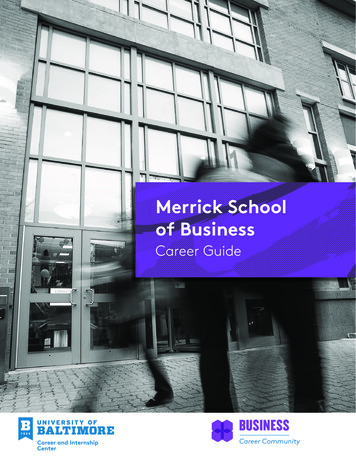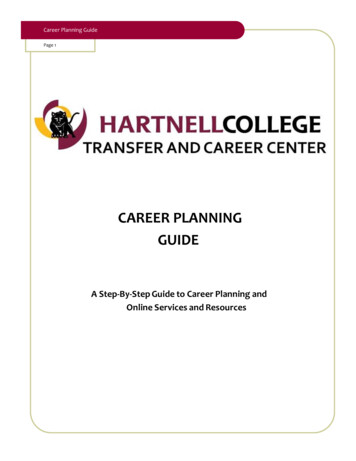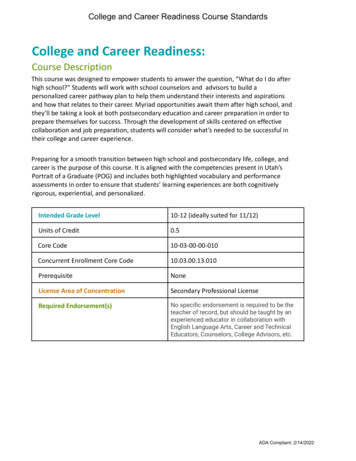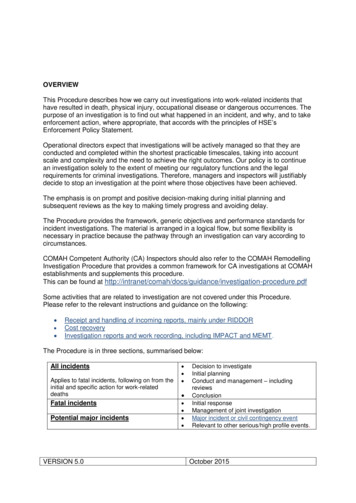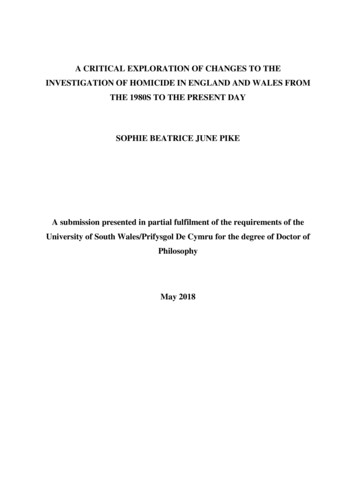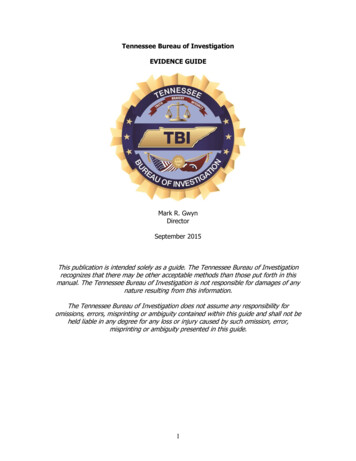
Transcription
Kuwait Chapter of Arabian Journal of Business and Management Review Vol. 3, No.1; Sep. 2013AN INVESTIGATION OF CAREER BENEFITS FROM THE MANCOSAMBA QUALIFICATIONDevan NaidooProf. Adolf LowiesManagement College of Southern AfricaMancosaAbstractThis paper examines the career benefits of the MANCOSA MBA qualification. This study tests thehypothesis that there is a positive link between obtaining the MBA qualification, productivity at theworkplace and career enhancement. This study also tests human capital theory which declares thatthe more educated a workforce, the higher the productivity. The framework of this study isunderpinned with a quantitative approach by utilising descriptive and inferential statistics. Thefindings of the research yielded a positive correlation between the MBA qualification andworkplace productivity and career progression. In addition, the most important reason the MBAqualification is considered a competitive qualification in South Africa is because MBA graduatesapply their knowledge at their workplace. The finding of the study also lends support to humancapital theory, as it is proves that productivity increases in the workplace due to the MBAqualification. However, the survey also reveals that although the MBA is a famed businessqualification, it does not inspire entrepreneurial adventure, as most MBA graduates pursue personalcareers rather than entrepreneurial opportunities.Keywords; Career benefits - MBA qualification- human capital theory-productivity- alumnientrepreneurial spirit-Mancosa MBA1.1IntroductionThe Masters in Business Administration (MBA) qualification is one of the most popularqualifications currently pursued in South Africa. It is a qualification that attracts students andpractitioners from various fields in the country. The qualification had its origin in the DartmouthCollege Program in 1902 and was referred to as the Master of Commercial Science (M.C.S) (Carter1998: 15-16). Since, the humble origins, the qualification has moved from a focus on local businessdevelopment, knowledge and skills to meet the complexity of global business. South Africa washome to one of the first MBA programmes outside of the United States of America (USA). TheGraduate School of Management at the University of Pretoria (GSM) was founded in 1949 withtwenty five graduates who received their MBA degrees, the first batch of graduates to be awardedthe qualification by a non-American academic institution, MBACOZA (2010).In South Africa, MBA students’ are more prone to take up the qualification part-time and postmarket place exposure, MBACOZA (2010) Most MBA programmes in the country are tailor-madeto address past social inequalities and provide affordable and diverse enrolment criteria.MBACOZA (2010) projects that more than 4000 MBA students’ enrol at local business schoolsevery year and the demand for MBA graduates is set to grow in the country. The Council on HigherEducation (CHE) and National Department of Education maintains strict policy regulation on thequality of the MBA qualification in the country.53
Kuwait Chapter of Arabian Journal of Business and Management Review Vol. 3, No.1; Sep. 2013In line with maintaining the value and quality of the MBA qualification, this study describes howMBA graduates use the theoretical knowledge and skills to gain competitive advantage in theirwork environments.1.2 Research problemBusiness schools often tout several reasons for studying for an MBA. These are: Career advancement A higher-paying salary Paid training from Employer The skills to start your business Developing your personal expertise and business savvy Development of leadership roles Gain Networking skills and greater job securityThe advantages of the qualification promoted by most business are on the practical benefits thatwill accrue to graduates. But little if any research is conducted on the practical value of the degreefrom the perspective of knowledge transfer to practical skills benefits of graduates. Witzel, (2001:3-4) agrees that learning is not limited to theoretical knowledge and should be extended to itsimplementation, “In education, as in all services, the quality of the service depends to some extenton the consumer. Real learning is an active process. Learning is not about absorbing information. Itis about gathering and using knowledge”. The value of an MBA degree has been widely criticisedby scholars and business practitioners. Criticism includes assertions that business schools are too‘academic’, as they fail to provide what the business world needs, provide useful skills to preparebusiness leaders and does not allow for career mobility (Tay, 2001: 258-274) and Muuku; Harrisonand Seid ,( 2009: 237-242).1.3 Aim and Objectives and Research questionsThe aim of the study is to investigate how MBA graduates from MANCOSA have utilised theirknowledge and skills in the workplaces and identify how the knowledge and skills acquired in thedegree has enhanced graduates career experiences.The objectives of this study are to employ a focus on MBA graduates perspective of the applicationof their knowledge and skills in the workplace. This study will construct the investigation throughmatching graduates’ initial expectations of the qualification and their post qualification experiences,with a particular focus on how MANCOSA MBA graduates have used their knowledge and skills toenhance their careers. Both, benefits and possible hindrances for using their MBA knowledge andskills in the workplace will be highlighted. This study will use Human Capital Theory to understandthe career development of the MANCOSA MBA graduates.The following research questions were posed. Why did the MBA graduates choose to study the MBA qualification? What is the value of the MBA qualification for MBA graduates within their vocationalenvironment? Does the MBA qualification provide MBA graduates with a competitive advantage in theworkplace? How does the initial expectations of the MBA compare with MBA graduates?54
Kuwait Chapter of Arabian Journal of Business and Management Review Vol. 3, No.1; Sep. 20131.4 Literature study on human capital and the value of the MBA qualificationThe concept of human capital has been around since Adam Smith, who stated in his well-knownpublication, “The Wealth of Nations”, (Smith 2009: 129), that, “the most important form of capitalwhich embodies the abilities acquired by or useful to the members of society, abilities which arefound both in each individuals property, and in the patrimony he or she belongs to is the humancapital.”In the current global business environment, companies must leverage on their workforce to gain acompetitive advantage over their competitors. One of the strategies of continuous improvementemphasizes the need to utilise all available resources to ensure sustainability in an ever-changingand complex business environment. Amongst these strategies is to ensure the continuousdevelopment of the workforce, thus enhancing performance through the improvement of individualknowledge, skills and competencies required to perform specific tasks. In this regard companieshave promoted the pursuit of the MBA qualification in their workforce. The focus has been onemployee’s contributions gained through knowledge and skills of the business environment tocontribute to the competitive advantage of the company or organisation. Jordan (2004: 40) declaredthat, “the competitive advantage of an MBA is that it provides managers with a holistic perspectiveof management and business and it equips them to assist their organisations to deliver superiorbusiness results by immersing them in the ‘enabler’ and cutting-edge disciplines.”Human Capital Theory (HCT) provides a holistic perspective on the potential of continuouslydeveloping the knowledge and skills of the workforce to achieve competitive advantage in themarket place. The following definitions reflect the benefits for employees, the organisations andmarketplace to improve the knowledge and skills of the workforce.The following are an assortment of definitions of Human Capital Theory (HCT): Baron and Armstrong (2007: 5), “conceptualises workers as embodying a set of skills whichcan be ‘rented out’ to employers. The knowledge and skills a worker has, which come fromeducation and training, generate a certain stock of productive capital.” Human Capital is “the knowledge, skills, competencies and attributes embodied inindividuals that facilitate the creation of personal, social and economic well-being”(Organization for Economic Co-operation and Development or OECD, 2001: 18) According to Olaniyan and Okemakinde (2008: 158), the concept of human capital“emphasises that the development of skills is an important factor in production activities.”The basic premise of HCT implies that the better educated and skilled an individual is, the higherthe salary earned by that individual, the greater the applied productivity from that individual withinthe organisation, therefore the greater the yield on company profit. HCT has led to an increase inthe development of vocational schools focussing on the education of adults “to meet the needs ofskill development across all occupational strata in the global economy” (Belanger and Tuijman,1997: 7). The linking of human capital theory to continuous learning has seen a remarkable increasein the provision of vocational schooling in past 40 years (Livingstone, 1997: 10).Mankiw(1997:23) attributes positive externalities to human capital: “The idea that human capitalgenerates positive externalities appears in many recent discussions of economic growth and is, in55
Kuwait Chapter of Arabian Journal of Business and Management Review Vol. 3, No.1; Sep. 2013my view, very appealing”. This statement provides an explanation that accounts for why allcountries choose to subsidize education, why developing countries are concerned about the braindrain, and why good students prefer to be at schools with other good students. Once we startthinking about externalities, it seems unlikely that they are the same at all levels of schooling. Oneexternality mentioned by Mankiw (1997:25) is that educated people generate good ideas that entersociety’s pool of knowledge and this externality might well flow largely from the most educatedmembers of society.Therefore, differences in secondary and higher education would be more important than differencesin primary education. There is significant literature linking human capital investment to economicgrowth. As mentioned previously, countries such as Japan, China and Korea are evidence of thispositive externality of human capital. Heckman and Klenow (1997: 4) in their paper on “HumanCapital Policy” found that each additional year of schooling leads to approximately 30% higherGDP (Gross-Domestic Product) per capita. In economics, GDP is a measure of the market value offinal goods and services of a country during a specified period.One of the important findings by Heckman and Klenow (1997: 12) is that a year of schooling is notequivalent to the same amount of human capital in every country and the quality of a year ofschooling cannot be “perfectly correlated with the average attainment in a country.” This is obviousas the education system in each country is different to one another. As mentioned by Olaniyan andOkemakinde (2008: 158), political interference on education can be problematic as in the case ofNigeria. Heckman and Klenow (1997:12) posit that “countries with higher levels of technologyprobably have more advanced medical technology, contributing to longer life expectancy”. Sincelonger lifespan affords a longer working life over which to amortize an investment continuouseducational development is viewed as crucial to development. When training provided by theemployer does not meet the expectations of the employee, the employee then seeks furthervocational education to close the gap between competence and expectations (Xiao, 2001: 5). Theadvent of new technologies to aide, advance and optimize production means that the workforcemust ensure that the knowledge and skills are always kept relevant and up-to-date. Continuousimprovement therefore also applies to employees in relation to new knowledge and skills.Xiao (2001: 3), suggests that employers favour workers with higher education credentials duringthe selection process because the better educated worker can be trained quicker, easier and at alower cost than the less-educated worker. The desire to pursue further education is based on thecosts of the education as well as the perceived benefits from pursuing such education (Kjelland,(2008: 71).Kjelland (2008: 73) proposes that human capital theory argues that “education endows theindividual with productivity-enhancing human capital” and as such this increased productivityresults in increasing markets earnings. Kjelland (2008: 73) offers an argument based on SignallingTheory, which suggests that education only reflects “inherent human capital”. Kjelland (2008: 74)suggests that it is this “inherent capital, not education that increases productivity and leads to higherincomes. He suggests a positive correlation between education, productivity and personal income,upon which “both signalling theory and human capital theory depend.”Kjelland (2008: 71-75) argues that productivity is a result of inherent aptitudes, as hypothesized bysignalling theory. Signalling is about credibly conveying some information from one party to the56
Kuwait Chapter of Arabian Journal of Business and Management Review Vol. 3, No.1; Sep. 2013next. In this example related to human capital theory, prospective employees send a signal abouttheir ability level to the employer by firstly acquiring specific educational credentials. However,information asymmetry exists when one party has better information as opposed to the other. Grootand Oosterbeck (1994:156) argue that the quick completion of a degree signals greater ability, andtherefore should result in greater personal income. They also argue that the converse should beapplicable; that the years spent on education without achieving a degree should not result in anincrease in personal income.With regards to the effects of the MBA as a qualification for individuals, Holtom and Inderrieden(2007: 32), compute a 12% yearly return-on-investment for MBA graduates that graduated fromtop-ten schools and an elevated 18% return-on-investment for those MBA graduates from schoolsthat are not in the top 10; thus contradicting the claims made by Pfeffer and Fong (2002: 80) thatonly students graduating from highly ranked schools benefit economically from acquiring the MBAbusiness degree. According the study by FeedbackRocket.com (2012: 6), the annual average salarygrowth for MANCOSA MBA graduates was 16.5% per annum.Pfeffer and Fong (2004: 9) found that there is “little evidence that business studies are related toeconomic development. Bruce (2010: 39), in his analysis of respondents canvassed to determine thevalue of the MBA, determined that part-time students generally conferred lower ratings on valuemeasures. He attributes this lower scoring to “work-life balance problems” of the part-time MBAstudent. In the research done by Bruce (2010: 43), the following reasons are given by part-timeMBA students for fear of pursuing the MBA degree: “it might require more energy and time than I am willing to invest”. “it might be too stressful”. “it might severely limit the time I have for people who are close to me”.Bruce (2010: 43), hypothesized that if the value of a MBA can be correlated with job-satisfactionand job satisfaction is lower for part-time MBA students, then part-time MBA graduates will ratethe value of the MBA programme lower than that compared to fulltime MBA students.1.5 Conclusion to literature reviewThis literature review has shown the importance of companies to recognise the continuouseducational development of their employees. Human Capital Theory was a valued approach torecognising the potential of employee’s pursuit of educational advancement and the benefits thataccrue to both organisation and market place. However, the literature has shown that there has beena lack of investigation and developed focus on how employees use their educational knowledge andskills to map their own success in organisations. This supports the argument presented that if theemployee’s educational qualification are not recognised and managed by the organisation then thequalification loses the value and potential contribution to both employee and organisation. Thisreview argues for a shift from a macro (organisational) focus to a micro (employee) focus in HumanCapital Theory development and supports the focus of this study from the perspective of MBAgraduates in the workplace.57
Kuwait Chapter of Arabian Journal of Business and Management Review Vol. 3, No.1; Sep. 20131.6 Research designThis study builds on the relationship between the possession of an MBA qualification and the directbenefits that accrue to MBA graduates in the work or business environment. It aims at describingthis relationship using a positivist paradigm. Matthews and Ross (2010: 27), affirm that positivismis a paradigm which allows measurement and recording rather than subjective understanding tobuild on knowledge of a phenomenon. This allows data that is collected to be tested by a hypothesiswhich has been generated from existing theory. The above allows the researcher to theoretically testthe extent to which Human Capital Theory is significant in describing the benefits of an MBAqualification for graduates. For example, does the academic qualification result in promotion orincreased productivity in the work and/or business environment?In order to test this study’s proposed hypothesis, the quantitative method was selected . Accordingto Neumann (2011: 93), “A quantitative method is the most preferred method of measuring, ratherthan asking people their opinions or experiences about a particular subject and hence it provides awidespread acceptance of the positivist paradigm”.For the purpose of this study a survey research design was selected. Survey research design will beemployed to provide a numeric description of trends and perceptions of this studies population; thatis MBA graduates. The two main variables of the study: perceived benefits of the degree, prior tothe degree and the direct benefits that accrue post qualification in graduate’s work places will becompared to determine if the degree meets graduates expectations of the qualification. A surveywill allow identifying a trend in prior expectations and posting workplace experiences usingdescriptive statistics.The population of this study is MBA graduates. A survey questionnaire was chosen to collect data.A 5-point Likert scale was used to measure the perceptions of benefits of the target population. Thesurvey will be hosted by www.websitedesigns.co.za. The questionnaire was hosted for a period of31 days only, due to budgetary constraints.Participants were emailed a URL (Uniform Resource Locator). The URL will lead participants to aweb page where the questionnaire may be completed online. The information was saved in adatabase on the server and may then be exported to a CSV (Comma-separated Variable) as asummary of the results of the survey.1.7 Results from researchI was selected by my Employer to pursue the MBA programmeThe survey results indicate that 45% of respondents strongly disagree that they selected they chosethe MBA programme because they were selected by their employer to pursue the MBA programme.Also, 36% of the respondents disagree that they selected the MBA programme because of employerselection. However, only 2% of respondents strongly agree that they chose the MBA because ofemployer selection. The results on table 5 also show that as little as 4% of respondents agree thatemployers selected them to pursue the MBA degree while 14% of the respondents are neutral.I chose the MBA programme to improve my career optionsAccording to the survey results, up to 83% of respondents strongly agree that they chose the MBAprogramme in order to improve their career options. This is followed by 15% of the respondentswho agree that a career option was their main reason for choosing the MBA degree. Only a verysmall percentage of 1% of the respondents is neutral and disagree that they chose the MBA because58
Kuwait Chapter of Arabian Journal of Business and Management Review Vol. 3, No.1; Sep. 2013of career options. As a matter of fact, no respondent strongly disagree that career option wasimportant in making the MBA move.I chose the MBA to increase my earning powerThe results show that 54% of respondents strongly agree that they chose the MBA programme inorder to increase their earning power. This is followed by up to 31% who also agree that increasingtheir earning power was important in making their decision for graduate management education.About 11% of respondents are neutral while only 4% disagree that increase in earning power wasimportant in making their investment decision for graduate management education. No respondentstrongly disagree that increase in earning power was important in the decision making process.I chose the MBA programme to develop my business management knowledgeThe survey results show that 71% of respondents strongly agree that they chose the MBAqualification in order to develop their business management knowledge. This is followed by 26% ofthe respondents who agree that developing their business management knowledge was important inchoosing the MBA qualification. Only 1% of the respondents are neutral about this criterion and2% of respondents disagree about it.Other Reasons for Choosing MBAI chose the MBA abilityDistance LearningFlexibilityGood Combination of Practical& Theoretical ApplicationQuality of Course ContentTotalThe results of this table show that 22% of respondents chose the MBA because of affordabilitywhile 31% chose the respectable qualification because of distance learning. Also, 16% of therespondents chose the degree because of flexibility. Only 9% of respondents chose the programmebecause of good combination of practical and theoretical application. Notably 21% of therespondents were interested in the quality of the MBA course content.Perceived Benefits of the MBAEmployer Value of MBAMy Employer valuesActual Response%my MBA credentialsStrongly AgreeAgreeNeutralDisagreeStrongly DisagreeTotal284520951072642198510059
Kuwait Chapter of Arabian Journal of Business and Management Review Vol. 3, No.1; Sep. 2013The results on the table show that 26% of respondents strongly agree that their employers valuetheir MBA credentials. Also, 42% of the respondents reported that their employers value their MBAcredentials while 19% of the respondents remain neutral. Only 5% strongly disagree that theiremployers value their MBA credentials while 8% disagree that their employers value their MBAcredentials.Career Advancement from MBAI have advanced inActual Response%my career since myMBA graduationStrongly Agree4643Agree3936Neutral77Disagree1110Strongly Disagree44Total107100The results show that 43% of the respondents strongly agree that they have advanced in their careersince their MBA graduation. A further 36% of the respondents agree that they have advanced intheir career while 7% remain neutral. Only 4% strongly disagree that they have advanced in theircareer while 10% disagree that they have made progress in their career since MBA graduation.Increased Earning Power from MBAThe MBA hasActual Response%increased my earningpowerStrongly Agree4340Agree2725Neutral2321Disagree1110Strongly Disagree33Total107100The survey results show that 40% of respondents strongly agree that the MBA has increased theirearning power. Also, 25% agree that the MBA has increased their earning power while 21% remainneutral. Only 3% strongly disagree that the MBA has increased their earning power while 10%disagree on this.Empowerment from MBAThe MBA hasActual Response%empowered me tostart up my ownbusinessStrongly Agree1918Agree1514Neutral444160
Kuwait Chapter of Arabian Journal of Business and Management Review Vol. 3, No.1; Sep. 2013Disagree1615Strongly Disagree1312Total107100The survey results show that 18% of the respondents strongly agree that the MBA has empoweredthem to start up their own business while 14% of the respondents agree to this. However, 41% ofthe respondents are neutral about being empowered by the MBA while 15% disagree that the MBAhas empowered them to start up their own business while 12% strongly disagree that the MBAenabled them to break into business.Improved Business Knowledge from MBAThe MBA hasActual Response%improved mybusiness knowledgeStrongly Agree6964Agree3735Neutral11Disagree00Strongly Disagree00Total107100Up to 64% of the respondents strongly agree that the MBA has improved their business knowledgewhile 35% agree to this as well. Only 1% of the respondents remain neutral while none of therespondents disagree or strongly aActual ResponseThe MBA has improved my businessknowledgeStronglyDisagreeThe MBA has empowered me to start upmy own businessDisagreeThe MBA has increased my earning powerNeutralI have advanced in my career since myMBA graduationAgreeStrongly AgreeMy Employer values my MBA credentials05061100
Kuwait Chapter of Arabian Journal of Business and Management Review Vol. 3, No.1; Sep. 2013Employer Awareness of MBAMy Employer isActual Response%aware of my MBAqualificationStrongly Agree5047Agree4542Neutral1110Disagree00Strongly Disagree11Total107100The survey results show that 47% of the respondents strongly agree that their employer is aware oftheir MBA qualification. Also, 42% of the respondents agree that their employer is aware of theirMBA qualification while only 10% of the respondents remain neutral about this. None of therespondents disagree that their employer is aware of their qualification while only 1% stronglydisagree that their employer is aware of their MBA qualification.Knowledge Application of MBAI apply the knowledgeActual Response%acquired as a MBAgraduate at myworkplaceStrongly Agree7267Agree2826Neutral44Disagree22Strongly Disagree11Total107100Up to 67% of the respondents strongly agree that they apply the knowledge acquired as an MBAgraduate at their workplace.While 26% of the respondents agree that they apply the knowledge acquired as an MBA graduate attheir workplace, 4% of respondents remain neutral on this. Only 1% of respondents stronglydisagree while 2% of respondents agree that they apply the knowledge acquired as an MBAgraduate at their workplace.Positive Corporate Impact of MBAMy MBA has aActual Response%positive impact on theperformance of myDepartment/DivisionStrongly Agree6056Agree3432Neutral1110Disagree2262
Kuwait Chapter of Arabian Journal of Business and Management Review Vol. 3, No.1; Sep. 2013Strongly Disagree00Total107100The survey results show that up to 56% of the respondents strongly agree that their MBA has apositive impact on the performance of their department. Also, 32% of the respondents agree on thisas well while 10% of the respondents remain neutral. Only 2% of the respondents disagree that theirMBA has a positive impact on the performance of their department. None of the respondentsstrongly disagree on this.Increased Productivity from MBAThe MBA hasActual Response%increased myproductivity in theworkplaceStrongly Agree5753Agree4037Neutral98Disagree11Strongly Disagree00Total107100The results show that up to 53% of the respondents strongly agree that the MBA has increased theirproductivity in the workplace. Also, 37% of the respondents agree on this while 8% of therespondents remain neutral. Only 1% disagree that the MBA has increased their productivity in theworkplace.Job Offers due to MBAI have received manyActual Response%job offers sincecompleting my MBAStrongly Agree1110Agree3331Neutral3129Disagree2624Strongly Disagree66Total107100The results show that 10% of the respondents strongly agree that they have received many joboffers since completing their MBA. A further 31% of the respondents agree on this as well while29% of the respondents remain neutral. However, 24% disagree that they have received many joboffers since completing their MBA while only 6% of the respondents strongly disagree on this.Figure 5 is a summary of the competitive advantage of pursuing an MBA qualification.63
Kuwait Chapter of Arabian Journal of Business and Management Review Vol. 3, No.1; Sep. 2013Summary: Competitive advantage of the Mancosa MBA5. I have received many job offers sincecompleting my MBAActual ResponsesStronglyDisagreeDisagree4. The MBA has increased my productivityin the workplace3. My MBA has a positive impact on theperformance of my Department/DivisionNeutral2. I apply the knowledge acquired as aMBA graduate at my workpaceAgreeStrongly Agree1. My Employer is aware of my MBAqualification050100Lack of Career opportunitiesThere is a lack ofActual Response%available careeropportunities forMBA graduatesStrongly Agree1110Agree1817Neutral2019Disagree3634Strongly Disagree2221Total107100Only 10% of the respondents strongly agree that there is lack of career opportunities for MBAgraduates. Also, 17% of the respondents agree to this while 19% of the respondents remain neutral.However, up to 34% of the respondents disagree that there is lack of career opportunities for MBAgraduates while 21% of the respondents strongly agree on this.Saturated Job MarketThe job market isActual Response%saturated with MBAgraduatesStrongly Agree22Agree1716Neutral3735Disagree3331Strongly Disagree1817Total107100Only 2% of the respondents strongly agree that the job market is saturated with MBA graduates. Afurther 16% of the respondents agree that the job market is saturated with MBA gradu
qualification. However, the survey also reveals that although the MBA is a famed business qualification, it does not inspire entrepreneurial adventure, as most MBA graduates pursue personal careers rather than entrepreneurial opportunities. Keywords; Career benefits - MBA qualification- human capital theory-productivity- alumni-
